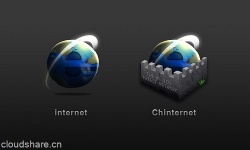“Chinternet”的版本间的差异
来自China Digital Space
| 第1行: | 第1行: | ||
Chinternet | Chinternet | ||
| − | [[File:chinternet.jpg|250px|thumb|left]] Contraction of “China” and “Internet”; the Internet with Chinese characteristics. China’s “[[Great Firewall of China|Great Firewall]]” filters certain foreign websites and webpages, while government and commercial censors block and delete content. Domestic platforms soak up traffic that would go to globally popular sites, if they were not blocked or otherwise rendered difficult to use: Weibo replaces Twitter, Baidu replaces Google, YouKu stands in for YouTube, and so on. | + | [[File:chinternet.jpg|250px|thumb|left]] Contraction of “China” and “Internet”; the Internet with Chinese characteristics. China’s “[[Great Firewall of China|Great Firewall]]” filters certain foreign websites and webpages, while government and commercial censors block and delete content. Domestic platforms soak up traffic that would go to globally popular sites, if they were not blocked or otherwise rendered difficult to use: [http://chinadigitaltimes.net/china/weibo/ Weibo] replaces [http://chinadigitaltimes.net/2009/06/chinese-censors-cut-off-twitter-hotmail-and-flickr/ Twitter], [http://chinadigitaltimes.net/2010/07/baidu-emerges-as-winner-after-google-ends-conflict-with-china/ Baidu replaces Google], [http://chinadigitaltimes.net/china/youku/ YouKu] stands in for [http://chinadigitaltimes.net/2009/03/youtube-blocked-in-china-official-says-video-fake/ YouTube], and so on. |
Chinese Internet users (netizens) also joke that what they are accessing is not the Internet, but the [[Great Chinese LAN]] ([http://en.wikipedia.org/wiki/Local_area_network local area network]). | Chinese Internet users (netizens) also joke that what they are accessing is not the Internet, but the [[Great Chinese LAN]] ([http://en.wikipedia.org/wiki/Local_area_network local area network]). | ||
2014年3月26日 (三) 16:37的版本
Chinternet
Contraction of “China” and “Internet”; the Internet with Chinese characteristics. China’s “Great Firewall” filters certain foreign websites and webpages, while government and commercial censors block and delete content. Domestic platforms soak up traffic that would go to globally popular sites, if they were not blocked or otherwise rendered difficult to use: Weibo replaces Twitter, Baidu replaces Google, YouKu stands in for YouTube, and so on.
Chinese Internet users (netizens) also joke that what they are accessing is not the Internet, but the Great Chinese LAN (local area network).
<feed url="feed://chinadigitaltimes.net/china/great-firewall/feed/" entries="5">
[{PERMALINK} {TITLE}]
{DATE}, by {AUTHOR} </feed>





